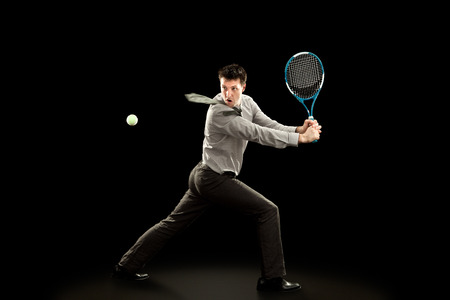
Copyright: zonecreative / 123RF Stock Photo
It’s that fortnight in the summer again when strawberry sales reach their peak and we all tune in to watch the world’s greatest tennis players battle it out to become the All England Champion on the grass courts in London.
Whether you’re an ardent tennis fan, or an occasional enthusiast, the appeal of tennis is easy to see. During a typical match, you’re treated to great athleticism, sportsmanship, excitement, and the occasional shock. Whoever plays best on the day wins.
But have you ever stopped to think what it takes to be a top player, like Roger Federer or Serena Williams? And what you need to stay at the top once you’ve got there? You’re probably thinking of things like skill, desire, mental as well as physical strength, and staying injury free. These are all really important, but there’s one you might have overlooked – leadership.
Take teamwork – an essential part of leadership. No successful tennis professional has ever got where they have on their own. Although it’s the player who’s ultimately responsible for doing the business on the court, every single one of them has a carefully-selected team behind them.
There’s a coach whose job it is to help the player improve and iron out weaknesses, a medical team responsible for keeping the player in tip-top physical condition, and a manager or agent who looks after the player’s schedule and finances to name a few. Each member of this team has their own important role and they’re trusted by the player to do it to the best of their ability.
To be a champion, the player has to trust his team implicitly. They must be prepared to do things differently or work harder on things they don’t like if the coach tells them to. If a physio or doctor suggests they shouldn’t play, or to look after a certain area of their body, they need to take that advice on board. And they need to be sure their manager or agent will look after everything else so they can just train and play.
If there’s a weak link in this chain anywhere, failure will usually follow.
Like all good leaders, top players know the importance of acknowledging this team, so they’ll publicly thank them in interviews. Giving credit is something the best leaders do naturally as they know it will inspire others to want to do their best. They must also be prepared to change their team if it’s not working. Many top players change coaches several times in their career, usually when they’ve been knocked out of a major tournament or things aren’t going to plan. Sometimes they’ll have different coaches for different areas of their game, or for a particular playing surface, who will have to work together too.
Another vital aspect of leadership the best players must get to grips with is always wanting to improve. A good leader has to know what their weaknesses are and do whatever they can to improve them, just like a player does with their game. For example, if a player had lost an important match because their forehand or return of serve let them down, there’s no doubt they’d go away and work incredibly hard making it better for their next tournament.
Other reasons Federer and Williams have stayed at the top of their game for so long is down to their incredible work ethic, not being afraid to fail and seeing challenges as opportunities, which are all characteristics truly great leaders need. They don’t give up, keep learning their trade and believe they’ll win even when the odds are stacked against them.
So next time you’re glued to a thrilling five-setter or see an ace fly down the court, take a minute to think about the great leadership skills the player’s used to get to that point, as well as how brilliantly they handle their racket.
Anyone for tennis?







